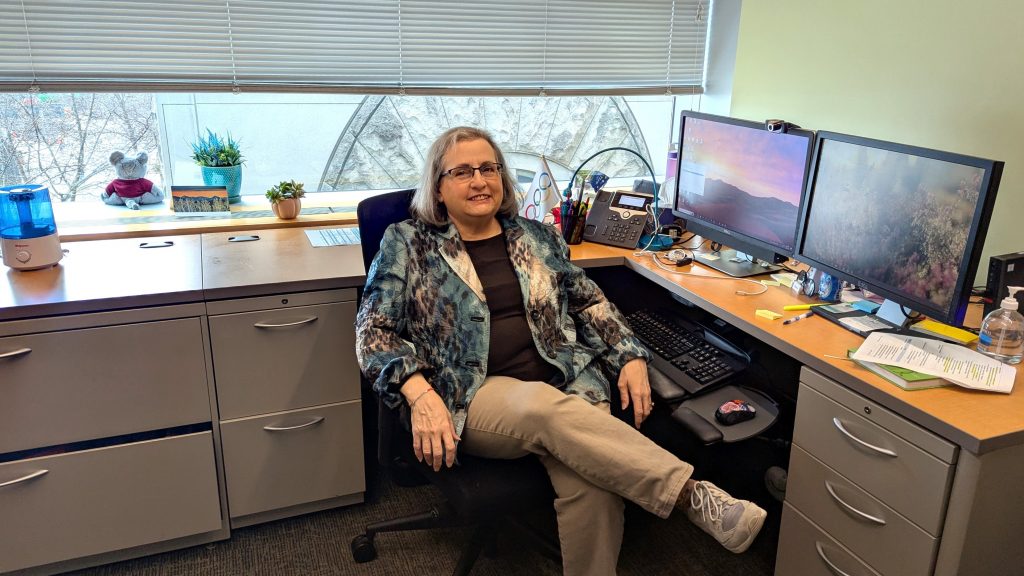
We recently sat down with Jody Hirsh, PhD, senior research administrator at the Chemistry of Life Processes Institute at Northwestern to learn more about her and what led her to CLP 13 years ago.
Tell us about your job.
I work on all stages of grant proposals, or what I like to say, ‘from conception to death.’ Depending on what’s due and what’s coming up, I could be working on submitting the grant. I could be working on what’s called ‘just in time,’ like when you’re about to get funded the information you have to send. I could be working on budget, going over the monthly finances for a grant or making changes to a grant. Sometimes, it’s not completely predictable. You need to be really flexible. When you’re doing research, things don’t necessarily fit nine to five. If something goes late, you roll with it. I see myself as someone who can cut through all the red tape and bureaucracy so that researchers can focus on the science.
Where did you grow up and what sparked your interest in science?
I grew up in Chicago and then we moved to Niles, Illinois around 1968. I think what led me to science was my interest in animals. In grade school, I would take out every book on animals from the north branch of the Chicago Public Library on California near Devon.
Did anyone in particular influence your interest in science?
My mother was a bookkeeper, and my father was a CPA. My father had a job at a company, but he also had some accounts on the side. When I was a junior in high school, I did ledger sheets for his accounts by hand and using a hand crank calculator. I thought it was so boring! Then, I had a high school biology class with a great teacher and it kind of went from there. My other interest was in foreign languages. I had started with French and then I picked up Spanish. I didn’t have a specific job in mind, but I knew I liked science.
Where did you go to college and what did you study?
I was a biochemistry major at the University of Illinois.
What did you do after college?
I worked for four years at a company in Des Plaines called UOP which stands for Universal Oil Products. Fun fact—if you go through Catalysis, there is a giant portrait of the chemist Vladimir Ipatieff, the founder of the company. I worked in a division focused on producing immobilized thermostable enzymes for making high fructose corn syrup. I worked on carbohydrate chemistry, microbiology and protein purification. In fact, I have a patent on producing an enzyme for making high fructose corn syrup from a thermostable mold. So yes, I’m a professional mold grower (laughs).
While I was working there, I had a friend who was a chemist in another lab that was close to me. One day, we commiserated about feeling like we weren’t being taken seriously at work. So, we both decided to go to grad school at Northwestern. She ultimately became a patent lawyer, and we’re still friends today.
So, where did you go to graduate school and what did you study?
I completed my PhD in pharmacology at Northwestern. The program required you to do two lab rotations in the summer before you choose your lab. The first is the biological or biochemical one and the next is physiological. I was a little more familiar with the first one because I had been doing microbiology. I did cell culture one summer on a project for a potential cancer drug. A year later, I did my physiological rotation in electrophysiology—the study of neurotransmitter release from the neuromuscular junction in its inhibition by adenosine receptors. I liked that and was good at it, so I stuck with it
What did you do after earning your PhD?
I did a postdoc at Rush for four years studying an orphan drug for multiple sclerosis, then I came back to Northwestern and did another postdoc where I was studying a toxin called palytoxin. After that, I became a research associate in the lab where I got my thesis and worked there for about nine years. Then, I worked for the Chief of Heme-Onc as a lab manager, where I became more familiar with the business side of research.
After that, I worked for the Chief of Endocrinology at FSM where I was responsible for the administration of different types of grants. In addition to managing the grants, finances, meetings and conferences, I also assisted with a T32 grant renewal application. When the funding ran out for that position, I participated in the free Certified Research Administrator course offered by the Northwestern University Research Administrative Professionals (NURAP). It was very helpful in securing my position here at CLP.
Early on, did you ever think about becoming a professor?
I thought about it, but I didn’t want my own lab. I also didn’t want the responsibility of writing grants all the time. You see where this is heading? I hated bookkeeping. I hated grants. So where do I end up? Doing budgets (laughs). It turns out I really like it and I’m good at it. The moral of the story is, do what you hate, and it will become what it is that you love.
by Lisa La Vallee

